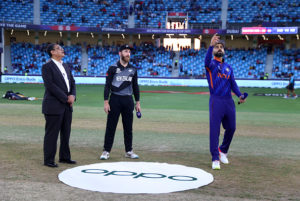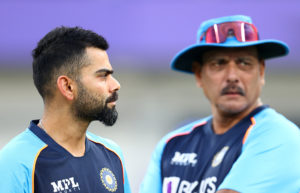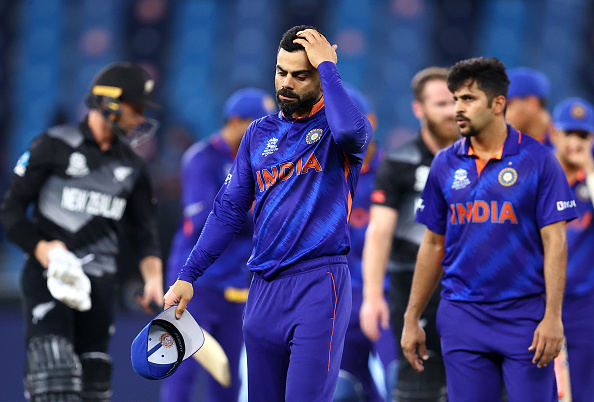On the verge of exit from the Group stage of the T20 World Cup, is the reason behind team India’s poor performance more than losing the coin toss? Patriot takes a look
Is it simply the toss that was instrumental in Team India’s successive defeats in a space of one week? Well, think again… In a space of just one week and three hours, India have taken just two wickets in 40 overs (two matches), and are now reeling below Namibia in the points table of Group Two.
Mathematically, India are still alive in this T20 World Cup if they win all three remaining games against Afghanistan, Scotland and Namibia by decisive margins to improve their net run rate (NRR). Pakistan have already entered the semi-finals by winning all four games to date, the last one against Namibia on Tuesday night. Their only game left is against Scotland.
India’s fortunes are now left in the hands of almost all other teams in the group. First New Zealand must beat Afghanistan on coming Sunday (November 7), but not by a big margin. Then either Namibia or Scotland pull-off an upset against the Kiwis, and that too with a big margin to help India come close in NRR.
And if any of these unlikeliest scenarios happen then New Zealand and India both will finish with six points each. And then it would all come down to the NRR to decide the second semi-finalist.
Another scenario is if India beat Afghanistan by a huge margin on Wednesday (November 3) and Afghanistan then beat New Zealand, all three teams will finish on six points, where the NRR will come into play to decide the second semi-finalist.
Is toss the reason?
Many would say that losing both tosses, against Pakistan and New Zealand, were the main reasons for India’s loss because the late evening heavy dew has been making it almost impossible for teams bowling second to grip the ball properly.
Then think again… Has skipper Virat Kohli’s team selection also played a part in self-destruction?
Kohli’s first-choice XI has hardly played any T20I cricket together in the lead-up to the T20 World Cup. While half of the current team was part of the long England tour, the other half was playing shorter formats in Sri Lanka. For example, Jasprit Bumrah and Mohammad Shami were bowling in a T20 international game together for the first time in 21 months, when they played in the first game against Pakistan.
And then picking half-fit players like Bhuvneshwar Kumar and Hardik Pandya cost India dear as the latter could not even bowl a single delivery in the crunch opening encounter against arch-rivals Pakistan. And even when Hardik bowled in the second game against New Zealand, he looked a pale shadow of what he promised against Pakistan in the Champions Trophy game in 2019.
It was not the case that only Hardik was the bowling all-rounder. Shardul Thakur has proved his worth with bat in so many games in the recent past. And when Shardul got his chance against Kiwis, it was not by replacing Hardik but by Bhuvneshwar.

Another reason that cost India dear, was the non-inclusion of Ravichandran Ashwin in the final eleven. The veteran off-spinner Ashwin was surprisingly picked up by five wise men of Indian cricket (senior selectors) due to his ability to pick wickets against almost all opponent teams. But Virat and team management (coach Ravi Shastri in particular) didn’t consider him good enough to feature ahead of Ravindra Jadeja or Varun Chakravarthy.
Varun looks to be a good prospect for the future, but then he is more of an economical bowler than a wicket-taker. However, when India finished both first innings at 151 and 110, Varun was any way out of the scene and India needed quick breakthroughs.
One could understand that Indian team management made a judgement of error by not picking their best spinner in the opening game against Pakistan. But what stopped them from correcting their mistake a week later against Black Caps, considering most other teams are playing with two or three main spinners. And Virat was adamant to go in with three-pacers and two spinners, not to forget that one of them Jadeja has been preferred over Ashwin more for his batting prowess than his ability to bowl.
For the record, it was not the first time that Virat preferred half-spinner Jadeja over the world’s finest spinner Ashwin in the last few months. Ashwin, the No. 2 Test bowler in the world, was constantly benched in all four Test matches in England that caused a heavy debate in the media then.
The question here is whether senior selectors led by former speedster Chetan Sharma even consult Virat over his choice of spinners in the squad for T20 WC?
And if yes, then how come the team’s best spinner has repeatedly been ignored by the skipper? And if no, then what tempted them to pick Ashwin out of the blue when the off-spinner had not even played white-ball cricket for Team India since 2017?
Lack of clarity at the top
Virat has looked like a confused leader for quite some time now. Leading a team that was counted as one of the favourites ahead of the tournament, India are now on brink of exit from the group stage for the first time since the 2012 T20 World Cup.
Having been in the Gulf region for over a month now, every cricket team was expecting India to be more than ready in comparison to the other teams coming from different conditions. But Virat and team management were constantly trying different combinations at the top of the batting order even before the actual tournament started.
India tried Rahul and Rohit first and then Rahul and Ishan Kishan in the two warm-up games. Both these pairs were in good touch in the warm-ups but failed to click when it mattered the most.

But then the big question is why did Virat and Shastri had to try Ishan at the top in the second outing against Kiwis. Demoting Rohit to the No. 3 batting order in the second outing could only be seen as a lack of confidence in the entire unit. Otherwise, why would a well-settled batting line-up of Rohit or for that matter Virat himself be disturbed after just one defeat?
Tiresome bio-bubble
Most of the Team India players have been travelling since May, starting with the World Test Championship (WTC) final in England. There was hardly a respite of about fortnight in the last five months from the tiresome bio-bubble that players were restricted to between the WTC and England series. Many players, from Virat to others, have spoken about mental fatigue during these months away from home and families.
But that’s the challenge before almost all the teams in the world. For Indian players, the fatigue factor was even worse because almost all top stars were playing the Indian Premier League (IPL) for the last one month and hardly got any rest before the T20 WC. Initially, many spoke about how Team India players would benefit by playing on almost the same tracks of Dubai, Abu Dhabi and Sharjah but all those talks have now proved to be the opposite.
No other national team players have to go through such a grinding schedule and deal with expectations like India. That’s why Indian players are looking tired and lacking the enthusiasm of a champion before such a prestigious tournament. This is another thing that neither Virat nor Shastri dare to point fingers at the holy cow, the money-spinner IPL for this disaster!
(Cover: Virat Kohli of India looks dejected after the ICC Men’s T20 World Cup match between India and NZ at Dubai International Stadium on October 31, 2021 in Dubai, United Arab Emirates PHOTO: Getty Images)





